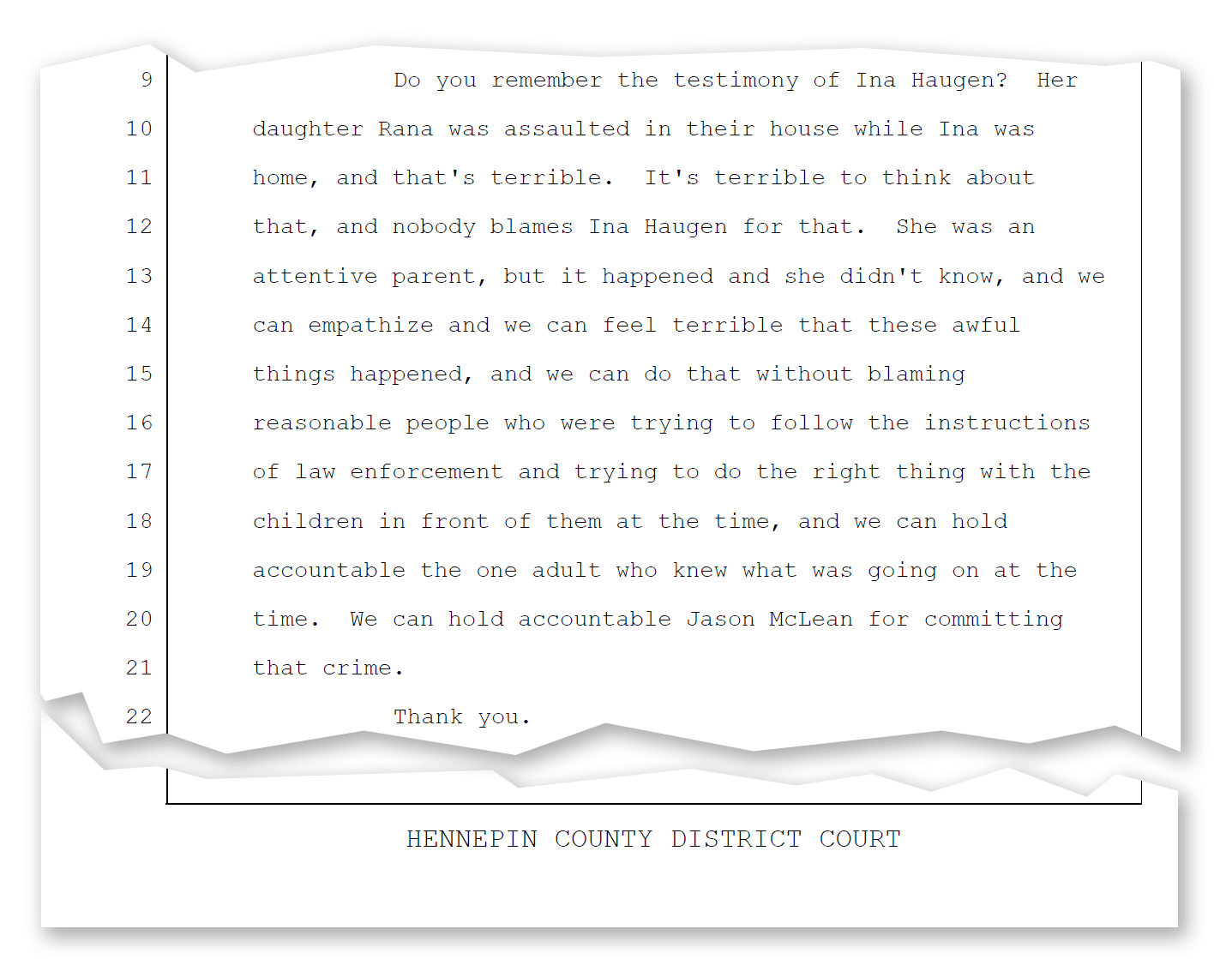Innocence Lost: Rumors, alarms got nowhere
Who knew about Children’s Theatre abuse? And who didn’t?

Go Deeper.
Create an account or log in to save stories.
Like this?
Thanks for liking this story! We have added it to a list of your favorite stories.
In January, former Children’s Theatre student Laura Stearns went to civil court. She was suing both a Children's Theatre actor and the company as a whole. Stearns argued that the employee had raped her in 1983, and that the theater fostered the culture that made the rape possible.

CTC’s lawyers argued that the Minneapolis theater should not be held liable. Over the course of the 10-day trial, they – along with lawyers for CTC’s insurance companies – offered various arguments as to why the institution should not be held responsible.
The jury found that the theater was generally negligent. But it assigned financial liability to the former employee, Jason McLean, and not the theater itself. McLean was ordered to pay Laura Stearns $3.68 million – money she likely will never see, because McLean is apparently outside the country and beyond the reach of civil law.
A major part of the Children’s Theatre’s defense hinged on the contention that the staff wasn’t aware at the time that some employees were sexually abusing students. But former students, parents of students, former employees, investigators and a former Hennepin County attorney disagree.
Turn Up Your Support
MPR News helps you turn down the noise and build shared understanding. Turn up your support for this public resource and keep trusted journalism accessible to all.

Rumors and investigations

“Just before school started, I had heard about the rumors,” said Mary Hallman, who enrolled her daughter Molly in the Children’s Theatre Company’s conservatory school to study dance in 1981.

Within just a couple of weeks of starting classes, Molly came home upset. She said one of her new friends had told her he had a sexual encounter with John Clark Donahue, the founding artistic director of CTC. Hallman went to CTC’s new education director at the time, Wayne Jennings, with what she’d heard.
“When I talked to him, I did not get the kind of reception I thought that I might,” she recalled. “He was not interested in what I really had to say, and said that they had investigated fully, that there was no truth to these rumors, the rumors had been around for years and they were false.”
Hallman pulled her daughter out of school immediately. Then, she says, she got in touch with a young man who said he, too, had been preyed upon by Donahue when he was a student at CTC and was willing to tell the administration about it.
A second meeting with Jennings got nowhere. Hallman twice tried waiting outside CTC board meetings to tell people what she’d learned, but no one was interested. "I just didn't get anywhere,” she said.
They did everything not to help the victims. They did everything to protect the institution.
“They just told me that they'd done their investigation, there was no truth to the rumor, and that was that." She felt she had run into a stone wall.
Hallman and another parent testified in Stearns’ trial that they contacted Wayne Jennings with concerns about possible sexual abuse in the early ’80s, only to be discounted or ignored.

On the witness stand in Stearns’ trial, Jennings, 89, said he couldn’t remember all the details from those years decades ago. But according to Bureau of Criminal Apprehension records at the time, Jennings said the few complaints he heard did not merit reporting. Jennings did not immediately respond to MPR News’ request for an interview.
When the BCA began investigating John Clark Donahue in 1982, two agents met with CTC’s executive director, Sarah Lawless. They reported that Lawless had admitted to being aware of rumors surrounding Donahue’s behavior with boys, but didn’t think there was any truth to them.
The investigators told her the theater shouldn’t interfere with the investigation. Lawless, who died in 2016, stated in court testimony in the ’80s that she interpreted that to mean she couldn’t tell the children or their parents about it. BCA investigator Michael Campion, who took over the case in 1983, disputed that interpretation during Stearns’ trial, and again to MPR News.

“The one thing that we made pretty clear to them is that we would ask you not to go interview children, because it gets real confusing if a number of people are interviewing a child about this matter,” he explained. “Don’t think you’re doing this investigation. That would be the thing that we would ask you. Otherwise, whatever you need to do to protect kids in this environment – you do whatever you need to do.”
For two years, Lawless and a few other board members knew about the investigation underway but put no new rules in place to protect the children. It was during this time that Laura Stearns says Jason McLean raped her. Lawless and the board did tell one person about the investigation, and did so on the very day they were informed it was happening: John Clark Donahue.

John Humleker was working for Lawless as her administrative assistant when Donahue was arrested in 1984.
“They did everything not to help the victims,” he told MPR News. “They did everything to protect the institution.”
You didn’t hear anything, you knew nothing, you saw nothing.
Humleker remembers the first staff meeting after the arrest. The board, lawyers and representatives of the insurance company were there.
“And somebody said, ‘Well, I heard a rumor,’ and the lawyer or person from the insurance company said, ‘You didn’t hear any rumors and if you did, you do not repeat that ever again.’ That’s the line that I take away, was basically ‘you didn’t hear anything, you knew nothing, you saw nothing.’”
Humleker did not testify in Laura Stearns’ lawsuit.
If you or someone you know is in need of help, there are resources available:
RAINN | https://www.rainn.org/ | 1-800-656-4673
1 in 6 | https://1in6.org/
Tom Johnson, the Hennepin County attorney who prosecuted Donahue in the ’80s, also brought charges against Jennings for failing to report parents’ concerns about abuse – a violation of the state’s mandatory reporting law.
“We knew we had Wayne Jennings because we knew we had parents who said, ‘Look, we came in and talked to him about it all,’” Johnson said.
Although the evidence was strong, Johnson said, a judge found the state’s mandatory reporting law unconstitutionally vague and dismissed the case. Jennings was never convicted of any crime, and jurors in the Stearns trial never learned that he had been charged.
CTC’s legal team requested, and the judge agreed, to limit all discussion of sexual abuse to events that happened before Stearns’ rape. So jurors also never found out about the student now known as plaintiff Jane Doe 76, who said McLean sexually abused her in the mid-80s after CTC management allowed him to return from a six-month suspension.

An enabling culture
Does Johnson see Children’s Theatre as responsible for the abuse its students experienced?
“Well, if they didn’t condone the acts, they certainly condoned the culture,” he said. “I mean, that was part of what made the Children’s Theater great. Adults and children all play by the same rules. There’s no lines to be drawn here whatsoever.”
That culture, he said, was promoted by John Clark Donahue, who espoused it “proudly. And he, I think, convinced the board that that was what made the theater great,” and that the board should “stay away.” Donahue died earlier this year.
The current managing director, Kimberly Motes, told MPR News in an interview earlier this month that while she does not believe CTC is legally liable for the abuse, the company is taking responsibility.
“CTC is a completely different place today, with much stricter and rigorous child safety policies and practices,” she said. “We have zero tolerance for child abuse today.”
The former prosecutor, Tom Johnson, agrees with some of what Motes said – but only some.
“Yes, it’s important for the community to know that they have changed, but that doesn’t absolve them of responsibility for what happened in the past,” he said. “You’ve got people who’ve been badly damaged, who have lost a big chunk of their life because this has been eating away at them.”

MPR News has interviewed dozens of survivors who’ve identified at least 20 adults who allegedly used their employment at CTC to abuse young people. Some of those survivors have been going to Cordelia Anderson for help. Anderson works with abuse survivors and met with some of the children from CTC shortly after the abuse. She’s counseled some of them as adults.
“Anytime you have that many people victimized, children victimized and that many different people doing it, you've got an organizational issue,” she said. “You've got an organizational responsibility and you've got organizational harm, on top of individual harm.”

But during Laura Stearns’ trial, Children’s Theatre’s lawyers shifted the blame elsewhere: onto students for not reporting the abuse, onto the BCA for not being more forthcoming with its findings, and onto parents for not keeping better track of what their children were doing.
"I felt like that's what the attorneys were trying to say - that I was not a very good parent because I let my daughter do those things,” said Ina Haugen. “I was a parent who was probably more involved and paid more attention than many. I knew much of the time where my daughter was when she went to parties at John’s house.
“How foolish I was to think that the theater paid some attention to who they had working there. I thought I could trust them. I thought they cared about kids."

Were you a student at the Children’s Theatre Company and have a story to share? Contact Marianne Combs to share your story.
Edited by Eric Ringham and Laura McCallum. Photos by Christine T. Nguyen and Evan Frost. Illustrations and production by William Lager.


